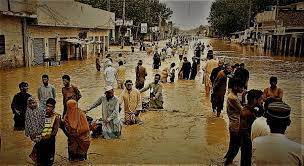
In a report recently published by Copernicus – Europe’s Earth observation agency – a distressing revelation has emerged: global heat continues increasing with January remaining the hottest month on record.
The report deemed January 2024 as the eighth consecutive month with record-high monthly temperatures, with global temperature rising 1.66C above the average during pre-industrial times.
As the global heat increases unchecked, Pakistan stands at a critical juncture. Having no effective heat coping mechanism and system in place, the country of 250 million faces the grim reality of possibly getting scorched by heat in the shape of wildfires. This does not rule out health issues related to extreme heat, which have been killing hundreds every year. The Washington Post’s analysis from September 2023 termed Pakistan as the epicenter of a global wave of climate health threats.
Although heat strikes indiscriminately, the most vulnerable to heat related illnesses are children. This is because children cannot adapt quickly to temperature changes and are therefore not able to remove excess heat from their bodies.
In young children it causes symptoms and illnesses such as higher body temperature, rapid heartbeat, cramps, severe headache, confusion, organ failure, dehydration, fainting and coma. There is poor mental development in infants;and developmental setbacks such as neurological dysfunction, and cardiovascular diseases. Keeping homes cool is considered as the immediate and short-term solution.
However, keeping homes cool during extreme heat is a challenge for everyone in Pakistan. But for those living in poverty it is much harder due to their inability to afford electricity to run electric fans or air conditioning or to purchase solar panels or other alternative technologies to run them. On the other hand, traditional cooling methods are inadequate in the high temperatures.
In addition to this, more than 40 million people in Pakistan do not have access to electricity. However, for many others, electricity supplies are erratic and irregular, and it is also said that the heatwaves have exacerbated energy shortages
Heat is menacing for economy as well. For instance, in 2022, Pakistan suffered a substantial economic setback due to extreme heat exposure. The country lost $16 billion. With heat increasing and heat related calamities becoming frequent, losses will multiply.
Extreme heat also leads to other disasters. For instance, the 2022 flood in Pakistan, which submerged at least one-third of the country and wrought tens of billions in losses, has been attributed to extreme heat. Although other reasons have also been considered as leading to the floods, it is thought that the disaster was triggered mainly by phenomenal heatwaves.
While Sindh, Punjab and Balochistan are the usual hit of extreme heat, something alarming has been noted about Khyber Pakhtunkhwa lately – a province considered to be relatively immune to the ravages of climate change.
In July 2023, Khyber Pakhtunkhwa meteorological department said that temperature has increased by 2-4 degree Celsius in the plains of the province and 2-6 degree Celsius in its northern areas. Human activities, such as the wanton tree cutting, and climate change have been considered as the two main causes of the increasing heat in the country.
Some cities in Pakistan receive more heat than others. For instance, in March 2022, temperature in Jacobabad in Pakistan’s Sindh Province crossed 100 degrees celsius for 51 straight days and reached 123.8 degrees. However, increasing temperatures and humidity, coupled with electricity shortages, water stress and the absence of heat adaptation measures, have exceeded thresholds that the human body can stand.
In a research published in the peer-reviewed journal Proceedings of the National Academy of Sciences (PNAS), it has been disclosed that 220 crore people in both Pakistan and India will face deadly heat if the temperature rises by 2 degrees celsius. The South Asian region has been the worst afflicted by increasing heat, with people at the risk of heat related illnesses. India, with a booming economy, can come up with a coping mechanism. However, for Pakistan, a country with a bleeding economy, the risks are enormous.
Although Pakistan has contributed less than 1 percent of global greenhouse gas emissions that lead to extreme heat, it is one of the top 10 most vulnerable nations threatened by climate change. This demands justice from the international community in the shape of actual aid and assistance and not just promises, as the cash strapped economy cannot bear the burden of what the world’s advanced economies have contributed to.
With global heat rising and its challenges increasing for Pakistan, the country’s uneven political trajectory makes it even more complicated for it do something about them. Issues like climate change are often missed out in the policy discourse in Pakistan, and most policy makers do not have any know how or understanding of climate issues. Political parties' manifestos also do not discuss climate change.
Additionally, the country has been in political turmoil since Imran Khan’s ouster, which is likely to worsen with the recent elections as allegations of rigging are aplenty and the potential new government, likely to be a coalition between Pakistan Muslim League Nawaz (PML-N) and Pakistan’s People’s Party (PPP), will be paralysed by mass protests from the beginning. In such a scenario, decisions on critical climate issues will likely be impossible to make for the political leadership.

